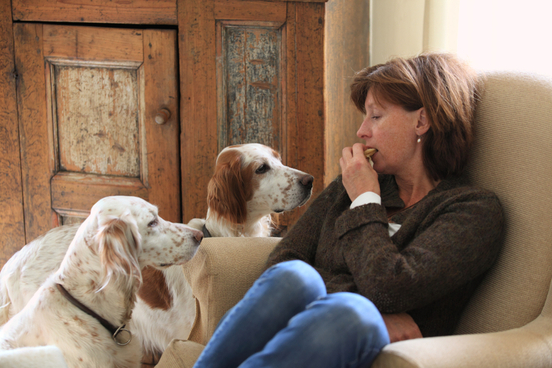
Snotter
Definition: to breathe noisily
Snotter is a dialectal British word, and, as is so often the case with dialect words, carries a certain trenchant charm. It also has a variety of closely-related meanings, as it may be used to refer to snoring, sniveling, sniffing, snorting, or simply as another way to say snot.
“Oo, ‘deed, my leddy, he’s just quite silly-wise,” responded the dame, in a whining melancholy key; “he just lies there snottering awa’,” pointing to the bed.
—Susan Ferrier, The Inheritance, 1824

Groak
Definition: to stare at people who are eating in the hope that they will offer to share their food
Groak is a word that is both obscure and of somewhat fluid meaning. In his 1910 book, English as We Speak it in Ireland, P. W. Joyce defined the word as “to look on silently—like a dog—at people while they are eating, hoping to be asked to eat a bit.” Joseph Wright, the compiler of the great English Dialect Dictionary, held that the verb meant “to whimper, cry for anything,” or “to look over one with a watchful and apparently suspicious eye.” Wright also included the word as a noun, and defined this sense as “a child who waits about at meal-times in the expectation of getting something to eat.”
If you own a dog, you know what it's like to be groaked.
—The Salt Lake Tribune (Salt Lake City, UT), 28 May, 1993

Sialoquent
Definition: (of speech) spraying saliva
The word sialoquent has languished in obscurity for hundreds of years, seemingly never coming up in normal written use—our only citations for it occur in dictionaries and glossaries. The great 17th century lexicographer Thomas Blount defined it in his work Glossographia as an adjective (“that spits much in his speech”), while Edward Cocker appears to have listed it as a noun. This confusion over parts of speech may have contributed to the word’s failure to gain a foothold in the language; or, it may simply be that, no matter if it refers to a quality or a person, sialoquent is something we’d all rather not spend much time thinking about.
Sialoquent, one that hawks and spits in discourse.
—Edward Cocker, Cocker’s English Dictionary, 1704

Cachinnate
Definition: to laugh loudly or immoderately
We have all heard the saying “laughter is the best medicine,” a tired old aphorism that was surely not coined by anyone who had spent time around a person who cachinnates. This word appears to have entered our language in the early 19th century from the Latin cachinnare, “to laugh boisterously”, and, sad to say, has never really caught on or enjoyed the popularity it deserves.
“Hee, hee, hee! Eck, eck eck!” cachinnated the facetious connoisseur and money-lender: “Thought to escape from me?–thought to remain here snug? Eck, eck, eck!”
—Fraser’s Magazine, Oct., 1837

Ingurgitate
Definition: to swallow greedily or in large quantities
We all occasionally have need to describe the eating habits of some boorish dining companion, the sort who inhales their fare in gulps and bursts, and sometimes it just doesn’t feel like gobble or gulp are strong enough words. Ingurgitate comes from the Latin ingurgitare, which means “to pour liquid into, as a flood; to gorge oneself” and so is well-suited to apply to any unwelcome table-mate.
Nothing pesters the body and mind sooner then to be still fed, to eat and ingurgitate beyond all measure, as many doe, by ouermuch eating and continuall feasts, stifle Nature, and choke vp themselues, which had they liued coursely, or like gallyslaues bin tyed to an oare, might haue happily prolonged many faire yeares.
—Robert Burton, The Anatomy of Melancholy, 1621

Screeve
Definition: to write (as a letter) in order to beg
As our epistolary habits become more and more electronically-based, we now hear complaints along the lines of "no one writes proper letters anymore." Notably, this nostalgia for the days of receiving letters written with a fountain pen on linen paper extends only to certain kinds of correspondence, such as thank-you notes; when someone is screeving a letter to you asking for money it matters little whether the request comes via text or in more corporeal form.
The report of his mission included that he had passed the portals of the “Three Stoats,” and had “liquored up” with the worthy landlord (who, in the course of friendly converse, hazarded the delicate supposition that Mr. Mallet was a “screever,” i.e., begging-letter writer)….
—MacMillan’s Magazine, 1 Nov., 1873

Malinger
Definition: to pretend to be ill or otherwise physically or mentally incapacitated so as to avoid duty or work
Considering that people have in all likelihood been pretending to be sick in order to avoid work for thousands of years, it is surprising that this word does not appear to have been in widespread use before the early 19th century. And although there are other words, such as shirk, that are related, the "avoidance of work" senses of these tend to have mostly arisen in the last two hundred years. Malinger comes from the French malingre, meaning “sickly, ailing.”
I had not the slightest doubt he was malingering, and that he knew I suspected him.
—The Indian Medical Gazette, 2 June, 1873

Whinge
Definition: to complain in an annoying way
One of the true strengths of the English language is the depths of nuance it exhibits when called upon to supply words for every possible kind of whining and complaining. In addition to whinge we have at our disposal girn ("to complain peevishly"), meech ("to complain in an ailing or peevish manner"), mewl ("to cry weakly like a child"), pule ("to make a plaintive moaning sound"), grex ("to grumble or complain often shrilly or scoldingly"), and a wide range of others.
“How unkind she is to me,” whinged Sir Benjamin, edging close to me, as I retreated to the sofa, “and all the girls down there dying for me, uncommon nice girls they were too, and ready enough to be made Lady Hopper, any one of them, but don’t be afeard, I’d rather have your sweet self, than any one of them, my beauty.”
—The Dublin University Magazine, March 1867
Quiz Time
Test your knowledge of strange human behaviors with our Odd Habits and Quirks Quiz.





